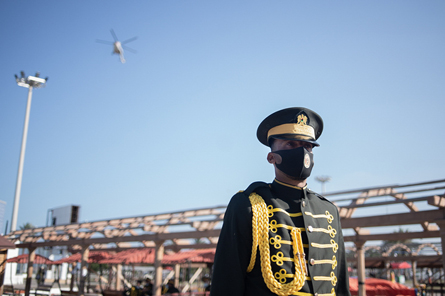Libya
In the wake of Libya’s revolution, the Libyan authorities sought DCAF’s support for reforming the country’s justice and security sector institutions.

Workstreams/Projects
The current situation in Libya requires a concerted and focused action among all international organizations involved. Under the leadership of the UN, the EU and other key multilateral agencies, international community actors need to support the establishment of more favourable conditions for national reconciliation and the effective conduct of democratic elections.
In this sense, the provision of technical and advisory assistance to existing Libyan institutions is an important part of international assistance, contributing to more favourable conditions for the resumption of inclusive political dialogue, while paving the way for reform.
DCAF’s work focuses on providing advice and technical assistance to the leading multilateral organizations operating in Libya on SSG/R strategies, policies and needs, as well as innovative approaches to implement SSR/G in post-conflict environments.
DCAF also operates the Libyan security sector legislation database.
DCAF aims to support Libya’s stabilization by virtue of exploring and applying SSR/G solutions to enable progress towards agreements to plan for SSR in Libya. Since 2020, DCAF has published a number of knowledge products showcasing technical knowledge drawn from operational engagements around the theme of hybridity in conflict environments in the continuum between SSR and DDR. These products include:
- 2020
- 2021
- Libya: Ten Years of Compounding Security Sector Hybridity (externally published by ISPI)
- Conference Report: Exploring the Implications of Oil and Gas Infrastructure Security in Libya
- Reforming Hybrid Security Forces in Arab States (externally published by Tawazun)
- Lessons from Post-2011 Trajectories in Tunisia and Libya (externally published by ISPI)
- The Road to Stability: Rethinking SSR in Post-Conflict Libya
- Institutionalised (In)Security: Exploring the MENA Region’s Governance Crises
- 2022
- Building security: How Europeans can help reform Libya (externally published by ECFR)
- Sovereignty, Responsibility and Reform: Navigating the Complexities of Hybrid Security Orders
- DCAF-ISPI
- Security sectors in the MENA: the economics of governance in crisis (externally published by ISPI)
- Armed Groups No Longer: Libya’s Competitive Political Militias (externally published by ISPI)
Since 2023, our engagements in Libya are focused on understanding the needs and priorities of Libyan security sector stakeholders (including community leaders, civil society, and oversight actors) and bringing their voices into the peace process and, hopefully, a future transitional process.
Our strategic goal for the coming years in Libya is to work towards the formulation of inclusive and locally owned security priorities for the elaboration of a SSR White Paper that could serve as a foundation for a future national SSR strategy in Libya. Our approach towards this outcome is articulated at three levels: local, institutional, and international.
Working at all three levels creates mutually reinforcing feedback loops. At the local level, we seek to understand the Libyan population’s needs and reflect on ways to make security provision people-centred at community level; at the institutional level, we identify capacity and regulatory gaps in service provision; and at the international level, we advise multilateral organisations on how to account for these elements in the design of broader efforts in the peace process.
In Libya, there are significant internal disparities in security governance. In their current form, the bodies established by the ceasefire agreement do not have the mandate to discuss internal security governance challenges, nor to address the specific security needs of the Libyan people.
DCAF’s project aims to support the establishment of a Libyan-owned vision for security sector governance and reform (SSG/R).
We will convene an independent and inclusive network of security sector practitioners from across the country in dialogues, first regionally and then nationally, to articulate contextually-grounded SSG/R policy recommendations that can feed into UN security track decision making, inform the development of the political track, and guide the security assistance of the international community and UNSMIL.
In the short term, our approach is to create a more inclusive space for dialogue on SSG/R, where Libyan stakeholders can formulate ambitions for more comprehensive reform efforts in the medium term. We seek to achieve:
- A national Libyan-owned process of articulation of concrete policy options for SSG/R in Libya;
- Key recommendations fed into wider intra-Libyan processes under the UN-led security track;
- Proactive policymaking by the international community and UNSMIL encouraged through sharing of lessons learned and reflections.
This project, implemented from April 2023 to April 2024, is made possible by the generous support of our donors:
- Swiss Federal Department of Foreign Affairs;
- EU Foreign Policy Instrument.
| Catherine Germond | Programme Manager |
| Axel Cottet | Junior Project Officer |
| Maria Al Ghazzawi | Intern |
PUBLICATIONS
Contacts
Catherine Germond, Programme Manager (c.germon@dcaf.ch)




